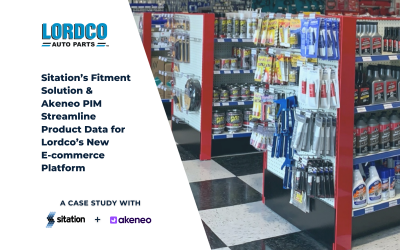Sitation’s Director of Automotive Solutions, Steve Bach shares the value of leveraging both PIM and MDM solutions as you aim to scale.
Businesses face the challenge of managing an ever-increasing volume of product information and master data. This information is vital for providing an exceptional customer experience, maintaining data accuracy, and gaining a competitive edge. To address these complexities, savvy enterprises are turning to Product Information Management (PIM) and Master Data Management (MDM) solutions. In this blog, we explore the benefits of PIM and MDM systems, along with various use cases and real-world business scenarios, showcasing how these solutions can revolutionize data management and drive streamlined business growth.
PIM and MDM
Product Information Management (PIM) and Master Data Management (MDM) are related concepts, but they serve slightly different purposes within an organization. The primary purpose of a PIM solution is to provide accurate, consistent, and compelling product information to support sales, marketing, and e-commerce activities.
MDM solutions focus on establishing and maintaining a single, authoritative source of truth for various types of critical business data, ensuring data accuracy, consistency, and governance across the organization.
In essence, while PIM is a specialized solution that focuses on managing and distributing product-related content, MDM is a broader initiative that encompasses a wider range of critical business data beyond just products. Many organizations may find value in implementing both PIM and MDM solutions, especially if they deal with complex data management needs across various domains.
The Power of Centralized Product Information
A PIM solution serves as the central repository for all product-related data, including descriptions, specifications, pricing, images, and more. By centralizing this critical information, businesses can ensure data consistency across various sales channels, providing customers with a seamless and coherent shopping experience. For instance, imagine a multinational e-commerce retailer consolidating product data from different regional teams into a unified PIM system. This not only maintains consistency across global online stores but also enhances the overall customer journey, resulting in increased sales and customer loyalty.
Improved Data Quality and Compliance
One of the most significant advantages of a PIM or MDM system is its ability to enforce data governance rules and validation checks, ensuring data accuracy and compliance with industry regulations. Take the example of a consumer electronics manufacturer. By implementing a PIM solution with stringent data governance, the manufacturer ensures that all product specifications meet industry standards and regulatory requirements, minimizing costly product returns and safeguarding their reputation.
Enriching Customer Experience with Data
PIM systems empower businesses to enrich product information with additional attributes, marketing content, and user-generated data. An online home decor store, for instance, can enhance its product descriptions with lifestyle images, videos, and usage tips. This engaging content captivates customers, resulting in higher conversion rates and fewer product returns.
Efficient Inventory Management and Supplier Collaboration
Integrating a PIM system with inventory management software enables real-time updates on product availability and stock levels. In the context of a consumer goods wholesaler, this integration ensures that their B2B e-commerce platform always displays accurate inventory information, preventing backorders and lost sales.
Moreover, PIM solutions can facilitate seamless supplier collaboration. A home appliance retailer can leverage a PIM system with supplier collaboration features, allowing each supplier to directly update their product information, such as availability and pricing. This collaboration streamlines data exchange, reducing manual efforts and improving communication between the retailer and its suppliers.
Accelerating Time-to-Market
With a PIM system in place, businesses can expedite the process of introducing new products or updating existing ones. A fashion brand, for instance, can use predefined templates and workflows to rapidly add new seasonal collections, capitalizing on market trends and gaining a competitive edge.
Personalization and Data-Driven Decisions
PIM and MDM systems enable businesses to leverage customer data and product insights for personalization and data-driven decision-making. By analyzing customer behavior data, a technology retailer can offer personalized product recommendations and discounts, fostering customer loyalty and repeat purchases.
Having efficient control over product information and master data is paramount for success. PIM and MDM solutions offer a robust framework for managing data, enabling businesses to centralize product information, improve data quality, collaborate effectively with suppliers, and drive personalized customer experiences.
As showcased through various real-world scenarios, implementing these solutions translates into streamlined operations, enhanced customer satisfaction, and sustainable business growth. Embracing PIM and MDM technology is not just a smart investment for today but a strategic step towards a successful future.
For more on how PIM and MDM solutions can lead to successful growth in your organization, contact us.




